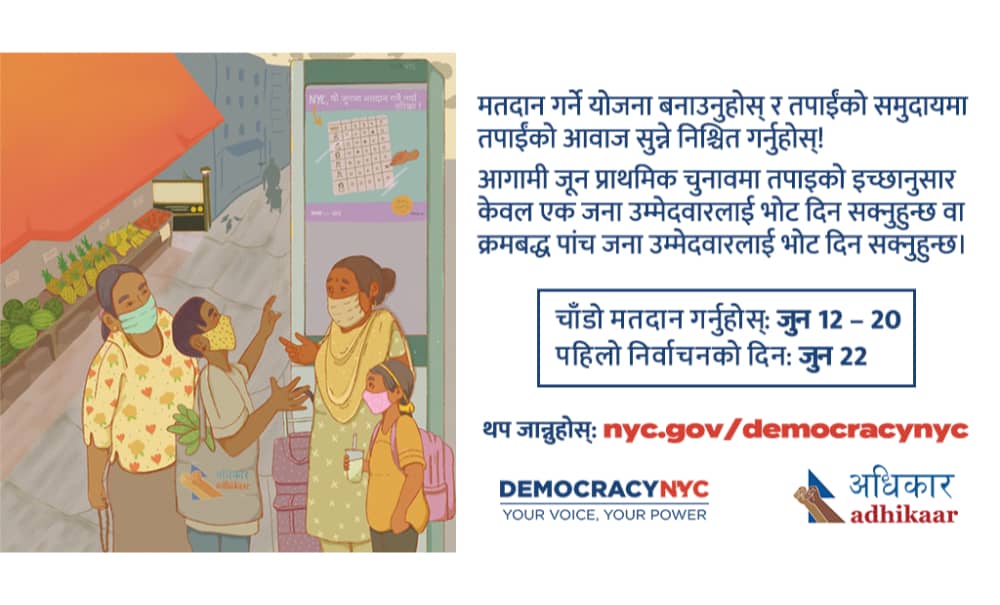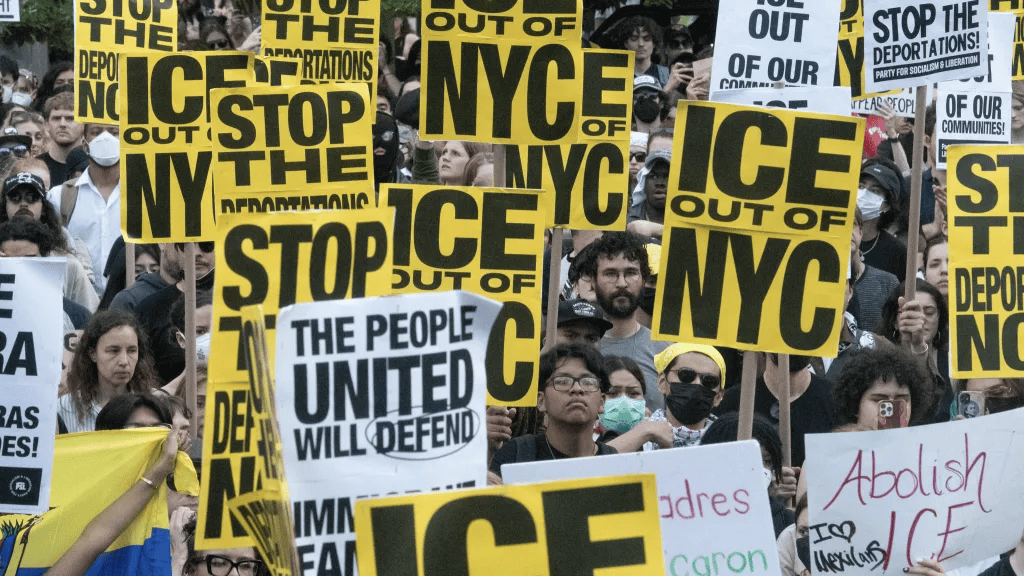
Dear friends,
The recent primary election of Zohran Mamdani as the Democratic party candidate for New York City Mayor was a defeat for the tired ideas, negativity, and Trump-lite style of divisiveness of Andrew Cuomo’s campaign. During his victory speech, Mamdani spoke of how the power of the Mayor can be used to “reject Donald Trump’s fascism, to stop masked ICE agents from deporting our neighbors and to govern our city as a model for the Democratic Party.”
Our first article examines a possible national turning point as New Yorkers pit themselves against inhumane immigration enforcement being wielded against families and neighbors. We follow with an article about the decision to suddenly strip thousands of Nepali immigrants in Queens and beyond of their legal status in the US, and how the local group Adhikaar continues to be a strong voice against the drastic changes being made to the TPS program.
Newsletter highlights:
- Immigration Court Deportations Provoke Outrage
- Local Nepali TPS Holders Suddenly Stripped of Legal Status
 Copyright Stephanie Keith
Copyright Stephanie Keith
1. Is NYC’s Federal Plaza struggle a turning point?
The Trump regime’s mass deportation campaign has arrived in New York City, and its spearhead is the deception and abduction of peaceful residents at the immigration courts in Federal Plaza. The Department of Homeland Security is blindsiding immigrants attending supposedly routine appointments by suddenly dismissing their cases. This unusual legal maneuver is meant to short-circuit the due process protections that immigrants normally retain as they petition for asylum or other legal status. In many cases, court dismissal exposes immigrants to “expedited removal”. The immigrants most at risk of immediate deportation are those who have been in the US for less than two years. This includes more than 900,000 people who entered the US with explicit government permission using Biden’s mobile app and appointment program, CBP One. (Trump’s DHS has twisted it into a self-deportation app called CBP Home.)
What’s happening in the immigration courthouses in Federal Plaza is essentially an ambush. DHS picks out vulnerable immigrants, and the courts instruct them to come in for what seem like normal check-in appointments. Immigration “judges” (who are employees of the federal Department of Justice) are instructed to dismiss cases as soon as the government lawyer makes the request, without allowing the usual two-week time period for a legal response. Swarms of masked ICE agents, prepped with lists and photographs of their targets, lurk in the hallways to handcuff immigrants (including an 11th grader from Queens) and take them away to detention.
Abducted immigrants are jammed into crowded bedless holding cells, bathrooms, and offices inside the Federal Plaza buildings. They are reportedly forced to sleep on the floor or while sitting upright, denied showers, changes of clothes, medical care, communication with their families, legal representation or proper food for days before being transferred to immigration jails. Although members of congress have the legal right to inspect immigration detention facilities, ICE has denied US representatives access to the Federal Plaza holding areas, claiming they are “sensitive transit zones.”
Immigrants who are quick to overcome shock, fear, and language barriers, who are prepared in advance, or who are fortunate enough to have legal counsel with them, can sometimes avoid or delay expedited removal. They are advised by advocates to object immediately to the unexpected dismissal of their case, making it clear that they reserve the right to appeal the decision. They are counseled to say that they are afraid of returning to their country, to request asylum, and to request a fear interview. But as a fact sheet from the Asylum Seeker Advocacy Project makes clear, it can be difficult to prevent expedited removal, depending on the judge, the timing, and other circumstances, including the availability of community support.
The brutal ICE arrests of law-abiding immigrants in NYC, along with parallel workplace and street raids in Los Angeles, have set off a wave of public revulsion and militant protest. They have further exposed the dishonest premises and cruelty of mass deportation, and in particular demonstrated how broadly it affects all residents.
Most New York families include at least one immigrant. About 40% of NYC residents were born outside the US. One million New Yorkers live in a household that includes an undocumented person. To Trump and Stephen Miller, that makes the city look like a target-rich environment for mass deportation. But for millions of immigrant residents, and millions more who care about them, the spectacle of masked Homeland Security thugs tricking, arresting and brutalizing law-abiding immigrants attending scheduled check-ins is galvanizing. The current demonstrations outside immigration courthouses include many highly motivated family members, intent on protecting their loved ones. Concern over ICE arrests has radiated outward in concentric circles, drawing in friends, neighbors, teachers, activists and ultimately, even mainstream politicians like Kathy Hochul and Jerome Nadler. Ordinary NYC residents and city officials like Comptroller Brad Lander are showing up at immigration courts to accompany endangered people out of the building and pass out legal advice leaflets.
The press, including the New York Times, The City, and other outlets, has played a key role in raising awareness of ICE’s deception and abduction of immigrants at Federal Plaza. Special mention must go to Documented, a non-profit newsroom reporting “with and for immigrant communities,” which appears in English, Spanish, Chinese, and Haitian Creole. Their intensive coverage took an inside track when their reporters argued and pressured their way into the Ted Weiss Federal Building, where surprise immigration court arrests were happening. The result was vivid firsthand testimony, including a series of stunning photographs by photojournalist Stephanie Keith, often showing the actual moment of ICE arrests. One striking feature of the photographs is the manifest dignity of the abducted immigrants, some of whom stare directly at their captors with resolute anger as they realize what’s been done to them.
There is some evidence that national sentiment is shifting towards immigrants. As recently as January, a disturbing Times/Ipsos poll had found that 55% of Americans supported Trump’s call for mass deportation of every undocumented person in the US. But two recent polls, The Economist/YouGov poll, taken June 13-16, and a June 11 Quinnipiac Poll, show that a majority of residents now oppose Trump’s handling of immigration. This is a modest but significant turnaround on what has been considered the president’s strongest issue.
In the meantime, Mahmoud Khalil and other immigrants kidnapped by ICE as retribution for their political views have been released by judges. Kilmar Abrego Garcia, still under indictment, has at least been returned to the US after he was “disappeared” into a Salvadoran gulag. Employers are pleading with the Trump regime to stop rounding up their most valuable workers, as whole towns become ghost zones. A recent series of national demonstrations, totaling roughly 4-6 million people, rebuked mass deportation and authoritarianism. And there are other signs of growing opposition to Trump’s attacks on immigrants in the interior of the country.
But it’s too soon to say what will happen. Is the political battle at Federal Plaza part of a turn towards immigrant justice? Or is it a launch pad for further authoritarian escalation?
WHAT CAN WE DO?
- Join the daily demonstrations at Federal Plaza by NYC Ice Watch, Rise and Resist and others.
- Check out Documented’s coverage of the Federal Plaza struggle, and consider signing up for their newsletter.
- Participate in New Sanctuary Movement’s Thursday Jericho Walks, circling the Federal Building.
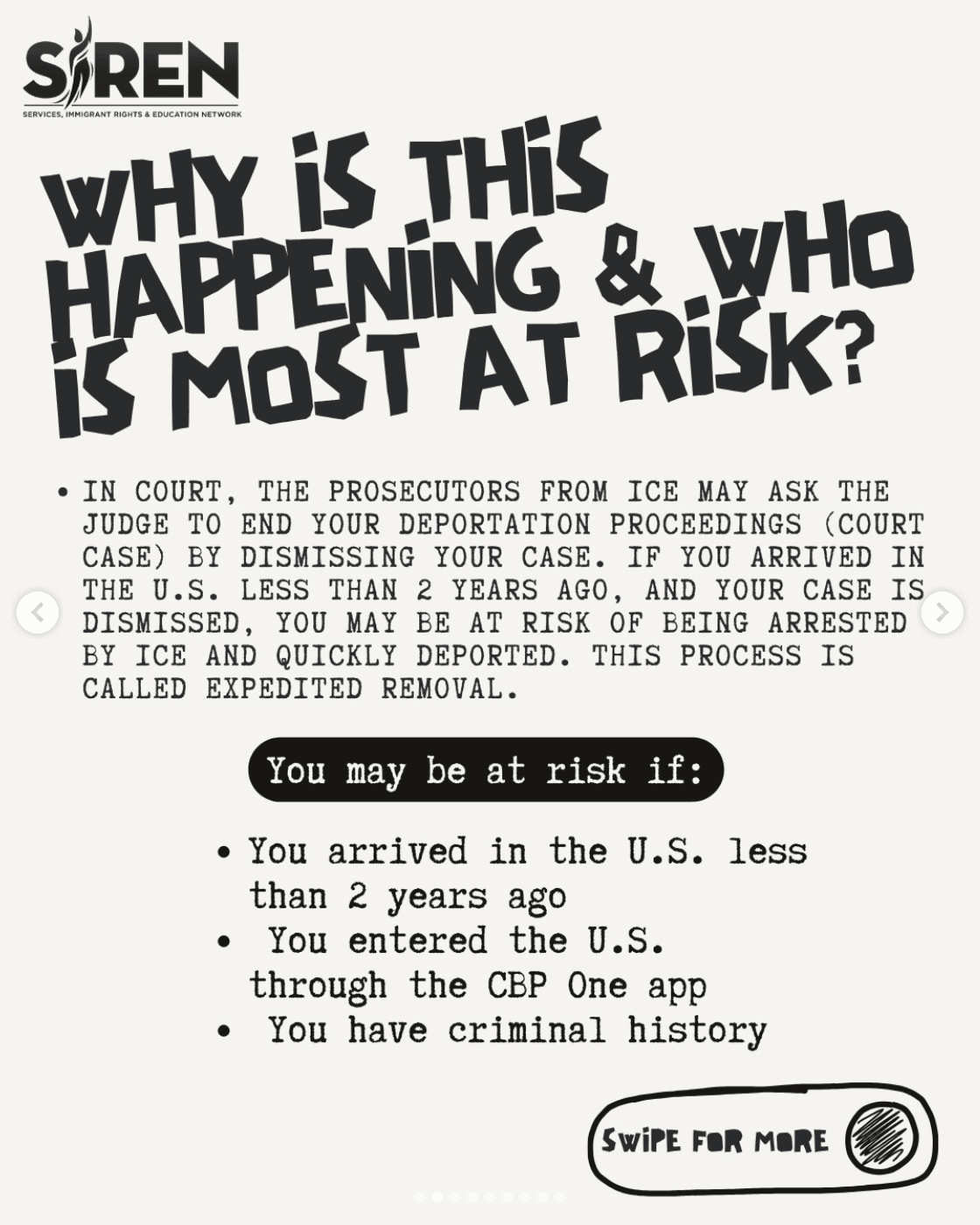 |
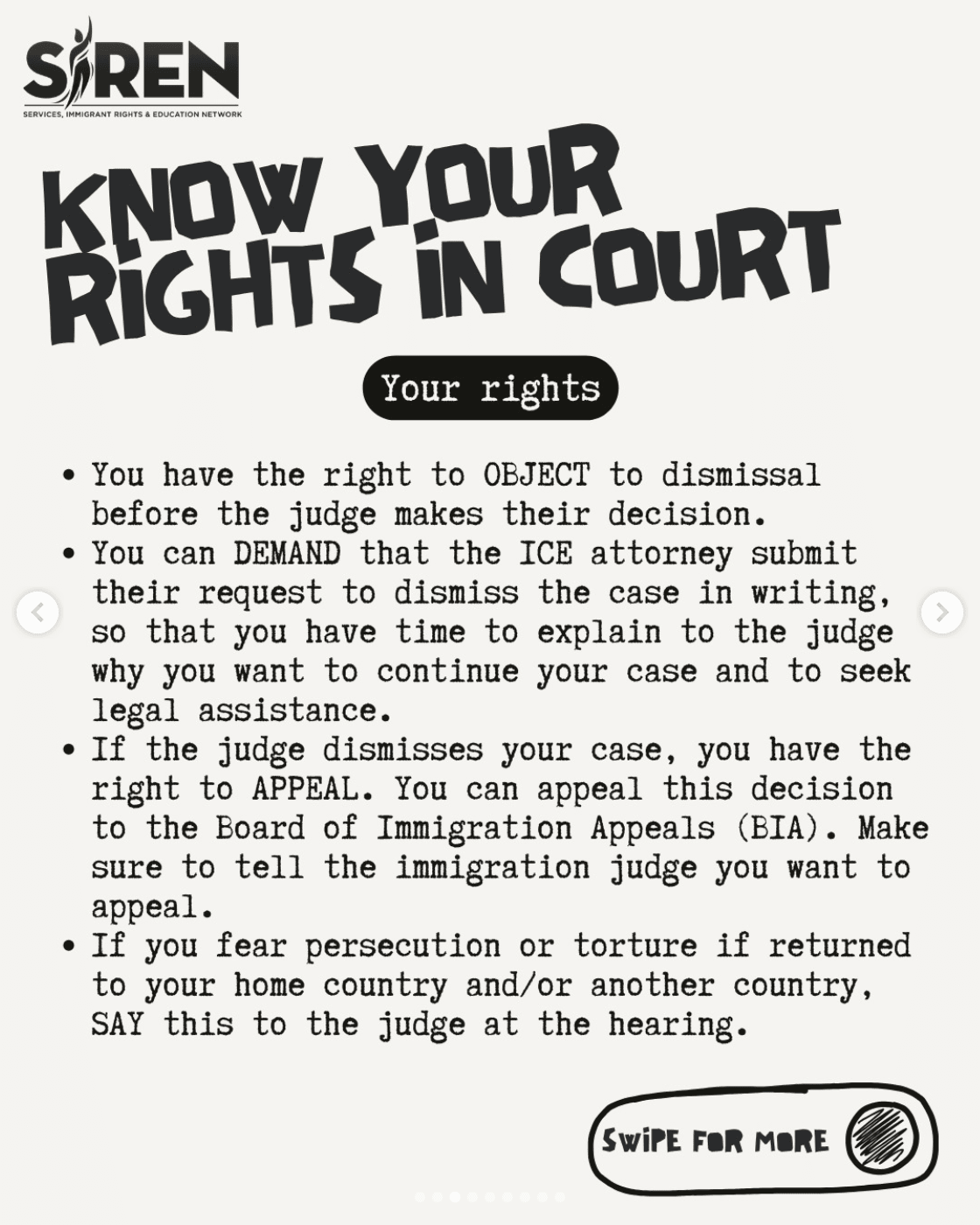 |
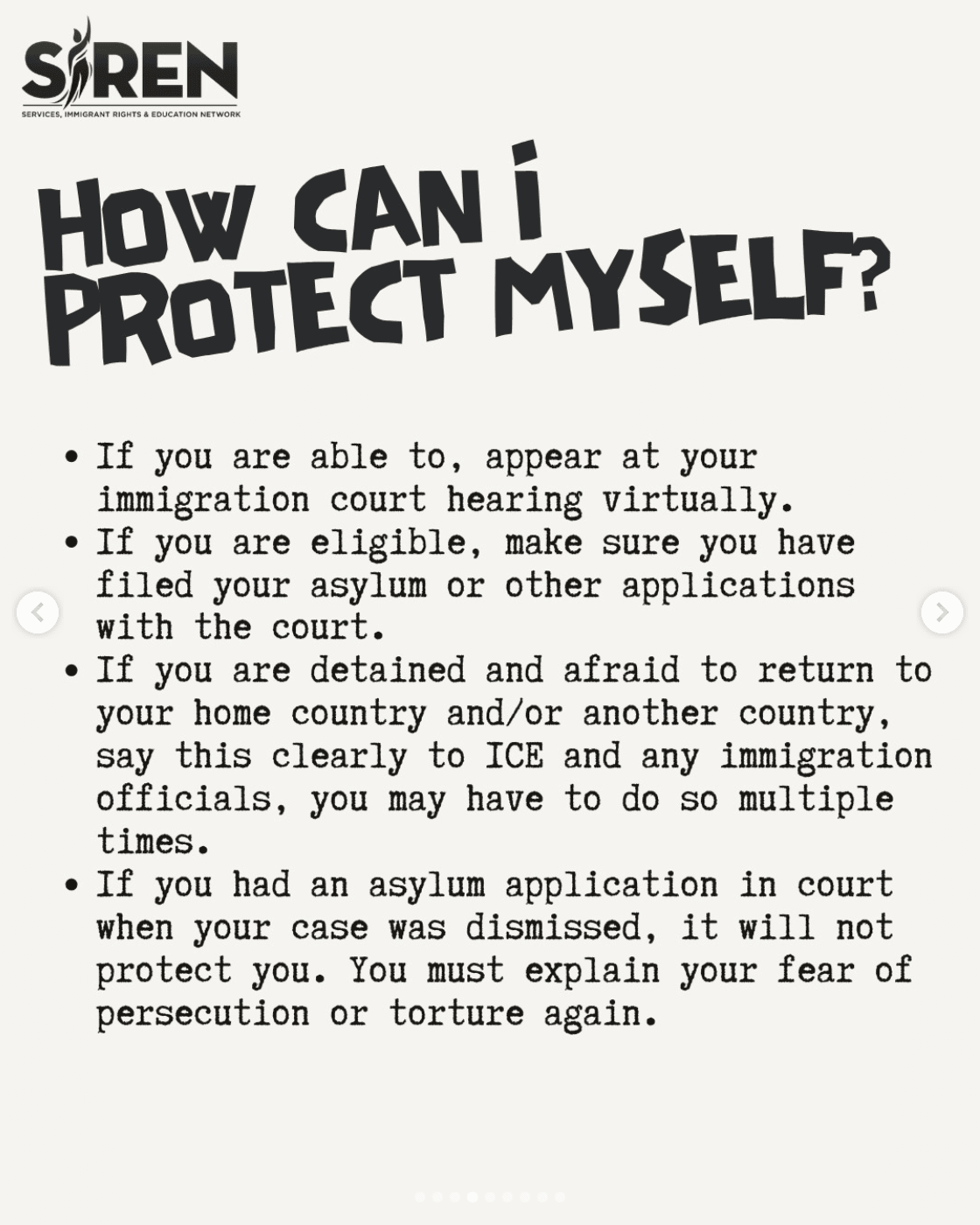 |
2. TPS Abruptly Cancelled for Nepali Immigrants
April 2015—A catastrophic earthquake hits Nepal, killing over 8,000 Nepalis and damaging infrastructure throughout the country. June 2015—The US government grants Temporary Protective Status (TPS) to 15,000 Nepali immigrants. TPS is a humanitarian program allowing people from designated nations to live and work legally in the US when returning to their home country is too dangerous due to war, natural disaster, or other extraordinary circumstances. 2018—The Trump administration attempts to terminate TPS for Nepalis but is challenged in federal court, and the Department of Homeland Security rescinds its termination efforts. 2020-2024—TPS is extended at regular intervals for Nepalis. June 5, 2025—The Trump administration announces the cancellation of TPS for Nepalis.
Of the estimated 12,700 Nepalis whose legal status is now threatened by the Trump regime’s abrupt revocation of their TPS protections this month, several thousand are neighbors, workers, and community members here in Woodside and Central Queens. Adhikaar, our local women-led immigrant justice organization serving the Nepali-speaking community, played a significant role in keeping TPS in place for Nepalis in 2019 and again in 2023. Now, in June of 2025, they once again commit to that same cause: “The Trump administration has turned its back on Nepali TPS holders. But we will not back down. Adhikaar condemns this cruel decision and stands with our community—fighting for dignity, justice, and the right to stay.” Despite DHS claims to the contrary, Nepal continues to suffer aftereffects of the 2015 disaster. The country remains weakened by catastrophic flooding, fragile infrastructure, and the ongoing socio-economic costs of climate damage.
While DHS historically grants a six-month window between the announcement of a TPS revocation and the end of legal protections, the DHS announcement on June 5, 2025, gives only 60 days: by midnight on August 5, 2025, all Nepali TPS holders are required to ‘self-deport,’ in the words of DHS.
Together with recent TPS revocations for Cameroon, Afghanistan, Haiti, and Venezuela, the termination of TPS for Nepal follows a pattern of federal actions targeting immigrants of color, especially working-class immigrants from the Global South. The Trump regime’s cancellation of this humanitarian program—established by Congress in 1990 with bipartisan support—affecting hundreds of thousands of TPS holders, joins up with mass deportations, the proposed hyperfunding of ICE, and new restrictions on and dismissal of asylum claims as an emerging architecture of fascist anti-immigrant policies in the US.
The termination of TPS designations for Cameroon and Afghanistan is being challenged in court, and a ruling is expected soon on a separate legal challenge to the termination of TPS for Haiti. But there is yet no known legal action against the cancellation of TPS for Nepal.
The removal of TPS protections for Nepalis coincides with the Trump State Department’s suspension of interview appointments for new student visas. For 8,000 Nepali students approved for study in the US this year, this demands a drastic reorientation of their education plans; many are instead now seeking to travel to Canada, Japan, Australia or the UK for their university education.
WHAT CAN WE DO?
In solidarity and with collective care,
Jackson Heights Immigrant Solidarity Network (JHISN)
Follow @JHSolidarity on Facebook and Twitter and share this newsletter with friends, families, neighbors, networks, and colleagues so they can subscribe and receive news from JHISN.
